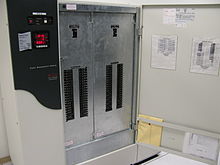


A power distribution unit (PDU) is a device fitted with multiple outputs designed to distribute electric power, especially to racks of computers and networking equipment located within a data center.[1] Data centers face challenges in power protection and management solutions. This is why many data centers rely on PDU monitoring to improve efficiency, uptime, and growth.[2][3] For data center applications, the power requirement is typically much larger than a home or office style power strips with power inputs as large as 22 kVA or even greater. Most large data centers utilize PDUs with 3-phase power input and 1-phase power output. There are two main categories of PDUs: Basic PDUs and Intelligent (networked) PDUs or iPDUs. Basic PDUs simply provide a means of distributing power from the input to a plurality of outlets. Intelligent PDUs normally have an intelligence module that allow the PDU for remote management of power metering information, power outlet on/off control, and/or alarms. Some advanced PDUs allow users to manage external sensors such as temperature, humidity, airflow, etc.
- ^ "Definition of: Power distribution unit". PCMag.com. Ziff Davis. Retrieved March 8, 2014.
- ^ "Sentry Power Manager: Rack-Level Data Center Power Monitoring and Management". ServerTech.com. Server Technology. 2014. Retrieved January 1, 2015.
- ^ "Benefits of intelligent power distribution". www.vertiv.com. Retrieved December 29, 2023.